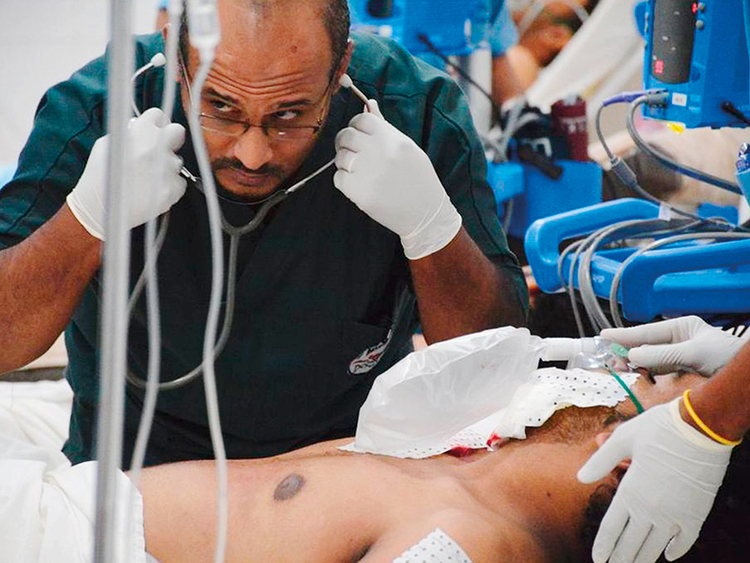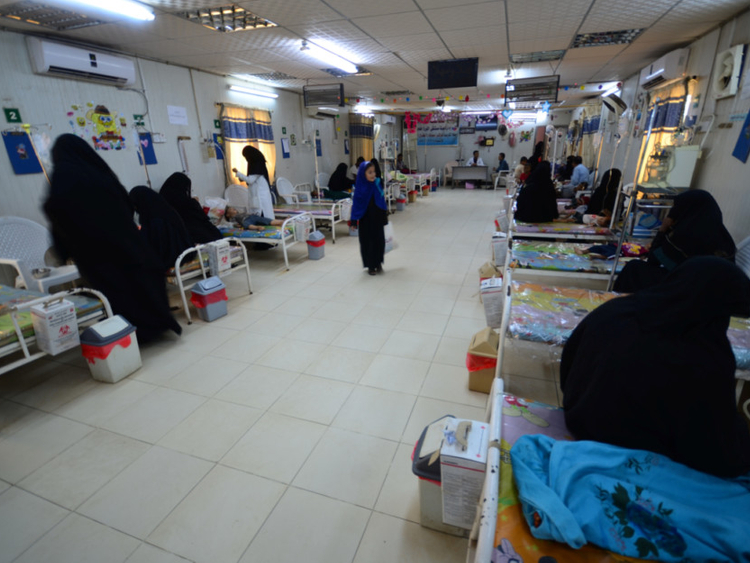Al Mukalla: A routine appendix removal went horribly wrong at a government hospital in Yemen’s port city of Al Mukalla on January 17, leaving the family of Sabah Basawad painfully searching for justice.
After surgery, Basawad was recovering just fine—until a nurse mistakenly gave her the wrong blood type.
She immediately went into shock and over the course of the next few days, she experienced acute renal failure, a blood clot in the right leg, and a series of other horrible complications.
“She nearly died,” Mohammad Baseef, Basawad’s husband, told Gulf News.
“The family was angry at the hospital that such a mistake could take place.”
Basawad’s family published their account of the story in the local press, fearing the hospital would try to cover up their medical error.
They demanded an investigation, accountability and compensation.
While the Ibn Sina hospital admitted to the error and promised the nurse would be held accountable, the family has yet to receive proper financial compensation.
The family said in a statement that the hospital gave them YR100,000($312.5) and another 300,000($937.5) to buy airline tickets to seek medical treatment abroad.
The price of a single ticket on the Yemenia airline from Hadramout’s Seiyun airport to Cairo costs almost YR300,000—which is not enough to cover two tickets.
Hospital officials say they spent around YR400,000 to treat Basawad’s deteriorating health following the medical error.
However, it says it will not pay the family compensation until the court issues a ruling on the case or the governor of Hadramout sends an official letter to the hospital for compensation.
But that won’t happen any time soon as the judicial authority in Al Mukalla is still not yet fully operational after Al Qaida occupied the city last year before it was liberated by Yemeni forces backed by Saudi Arabia and the UAE.
Doctors at the hospital say Basawad’s health has improved and said she is no longer in danger of renal failure or any other ailments.
The family, however, did not trust the doctors’ assessment and decided to fly to Egypt on their own expense—a cost Basawad’s husband, who sells goats for a living, surely can’t afford.
The family says they won’t give up their fight to get their compensation from the hospital.
Basawad’s case has shed light on the widespread medical errors of Yemen’s crumbling health system.
Local journalists who chronicle these incidents say hospitals are under-reporting medical errors.
Majdi Bazyad, the editor of the Naba Hadramout news site, told Gulf News that many patients are dying after surgeries due to lack of proper attention and care.
“A doctor who performed heart surgery on a woman at private local hospital, told the family after the surgery that she had to be transferred to another hospital after the surgery, and then disappeared and switched off his phone. The lifts weren’t working, so the family carried her down the stairs. There were no ambulances handy. The hospital’s ambulance came after 30 minutes. When the woman finally reached the other hospital, she died twenty minutes later,” he said.
Bazyad says doctors often intimidate journalists by threatening to take them to court if they publish any story related to malpractice.
The issue of medical malpractice has been effectively put on the backburner since an Al Houthi coup-turned civil war erupted in the country two years ago.
And while malpractice was common even before the war it has only gotten worse during the war.
Most of Yemen’s already poor health facilities have been destroyed.
Thousands of people have been killed and injured according to local and international right groups.
Health facilities spared from destruction are overcrowded with patients who come from war-torn regions of the country.
As a result, medical costs have sky-rocketed.
Dwindling faith in Yemen’s medical sector has cost the country nearly $1b as Yemenis prefer to seek medical treatment abroad.
Most patients travel to Egypt, Jordan or India for treatment.
Dr. Al Abed Abu Mousa, a former health official in Hadramout and lecturer of Medical Ethics at Hadramout University, says that the protocol to report medical errors is very tedious and complicated.
“Currently there is no medical authority that can investigate medical malpractice. The Medical Committee, which is authorised under law to investigate such matters, is controlled by Al Houthis in Sana’a, and there is no branch here,” he said.
Local activists believe that if courts step up and take a stance on malpractice, many lives could be saved.














